|
Somedays I love the internet. It makes me laugh my butt off, helps me realize that all millenials are having knee pain now and it’s not just me, and the endless amount of dog videos literally makes my heart feel warm and fuzzy. I mean seriously, the “Cheese Tax” song just dropped and I cannot thank the creators enough for its ridiculousness. Yet some days I wake up and it immediately gives me massive amounts of anxiety. Every possible thing seems to offend someone. People are trolling and canceling each other left and right, without any point of reference or attempt at understanding. The news loves to inundate us with trauma- literal trauma- just to get a click. Today is one of those days for me. Yesterday I spent too much time online, but I felt all the positive feelings. I was recording in my own IG stories, connecting with strangers in my DMs, and I even made a new Reel (something that happens once every few months). After a long day at work, I even felt like recording a quick podcast episode. Who even am I? It felt good and productive and even fun. Not today. Today feels like everyone is angry at everyone and it’s giving me major High School vibes- the bullying, the cool kids running things and being worshiped, and me just wanting out. It literally feels so similar to HS. I know I’m not alone in this. I know it’s a phenomenon our entire generation is experiencing, while having no rule book or guidelines to follow. So the question is, what even is a healthy boundary with Social Media and how do you know where to set it? For me it looks like this: Paying attention to my anxiety and listening to its warning. I could do the work to trace back exactly where this anxiety is stemming from (because there’s always a source; an old wound) but that should probably be done with my therapist. Instead of seeing my anxiety as the problem, today I’m seeing the trigger as the issue. I know that, for me, reading other people’s arguments stirs up feelings of “conflict is bad- someone’s going to get hurt!” My logical self knows this isn’t necessarily true and that I’m in no danger, but my emotional brain (which is hardwired to protect me) just doesn’t feel comfortable with it today. The feeling of everyone being mad at each other is just too painful and unsettling. Until I can (or want to) process this fear on a deeper level, I can choose to just listen to my body. It’s screaming at me that Social Media doesn’t feel emotionally safe today. That could last a week, a day, a month, who knows. But I’m taking it one day at a time. So I’m logging off. It’s as simple as that. Take a break. You may not have to jump to an extreme of deleting your accounts, although that may be necessary. Do what’s best for you. It may require unfollowing particular accounts that stir up these issues. I’ve noticed that even some really great pages intentionally post controversial things just because the engagement it will get will help their algorithm. All attention is good attention, right? Even if the majority of the posts are great/helpful/decent, if they are occasionally asking for a fight, it’s probably not a good account for me to follow, given my sensitivities. I know this isn’t groundbreaking information or new advice, but it’s simply a reminder. You need time away from the perfection, keyboard warriors, trolls, and trauma images. Even if it’s not directed towards you, witnessing it can be exhausting to the system. It’s okay to admit that and take good care of yourself. Tomorrow I’ll try again and if it doesn’t feel good, I’ll continue to listen to my gut feeling. Logging off is a reminder of how small my circle really is, and today, that’s a really, really good feeling. AuthorJulie Hilton is a licensed therapist in Atlanta, who specializes in working with trauma, anxiety, and Self-Worth issues. If you are looking for a therapist and located in Georgia or Florida, reach out today for a free phone consultation! 678-329-9129
17 Comments
"I want to give my body the best possible chance to feel as good as it can, for as long as possible. " I had a client ask me this question last week: “Julie, how do you stay motivated to go to the gym?”
I’m not going to lie. I didn’t exactly know how to answer her question at first. Partly because talking about myself to my clients always feels weird (it shouldn’t- we were just trained to not share ANYTHING and that, in my opinion, isn’t good for the therapeutic relationship), but mostly because I didn’t know what the honest answer was. I responded by saying something along the lines of, “I’m NOT always motivated. I don’t rely on motivation to get me there, because motivation is a feeling that comes and goes. If I waited to feel motivated, I’d never be consistent.” Solid response. But not the entire truth. In fact, that’s someone else’s response that I have read before and really appreciated, but I don’t think it tells my whole story. A more accurate answer, now that I’ve spent some time thinking about it, is that I AM motivated. Consistently. But not to go to the gym. Being fit is not my goal. Being a gym rat is not my goal. Being skinny is not it either (anymore). Rather, working out is a byproduct of my real goal- that I am absolutely motivated to work towards- and that is to take really good care of myself in this lifetime. Making the decision to “take good care of yourself” is simplistic, vague/general, and also life changing. It means different things at different ages. It changes and evolves over time, depending on your needs. It’s a mindset more than anything quantifiable. For me, it came from years of valuing results, but not valuing myself, and eventually realizing that my goals were hurting me. 149. That was the number I always wanted to see on the scale. Once a year, I had to hit 149. That was my rule for myself. When that was the object of my motivation, the pathway I got there was super unhealthy, both physically and mentally. I’m talking weeks of cutting out entire food groups and doing endless amounts of cardio, coupled with a drill sergeant voice in my head yelling at me for eating one piece of cheese or chocolate. Somewhere in my journey that started to shift and I began to realize how much I hated this goal. I loathed the number 149. My motivation left because it wasn't sustainable or built on the right things. And somewhere between the birthdays adding up and my body involuntarily changing (insert chronic nerve pain, bulging discs, and all the fun things being in your thirties brings) I began to value taking good care of myself more than anything aesthetic. I remember writing this in my journal a while ago: I want to give my body the best possible chance to feel as good as it can, for as long as possible. I spent a long time working through this and, I can’t necessarily explain the steps of how I got here, but taking good care of myself became bigger than just a number. Maybe some of the motivation is fear- fear of becoming like the older adults I used to see during my hospice career that had to be taken care of because they didn’t take care of themselves. Maybe it’s the fear that my nerve pain will one day impact my mobility and building muscle now feels like something I can control to combat that. But it’s also driven by love, and this is still a work in progress. Now my motivation isn’t to go to the gym, it’s to love myself well. Which also means working to let that drill sergeant go, stop dieting, start doing the movements that feel good to my body, sleeping more, going to therapy, and all the other self-care things that aren’t fancy or fun. Learning to love myself enough to do what’s needed over what society tells me I should care about has been a huge part of the journey. To answer the original question, I don’t have to feel motivated to wake up and go to the gym anymore because the gym itself isn’t the goal. Now I know it's what I need to do, because it’s one piece of a larger goal. I don’t ask myself if I want to go to the gym, because so many days the answer would be no. I check in with myself on whether I’m really giving my body a chance to thrive in the short amount of time I have on earth. So before I go to sleep, I set my 5:30am gym alarm without looking for or requiring motivation (and then of course I take my preworkout first thing after rolling out of bed to feel like doing it, before I can talk myself out of it). "Fear breeds smallness. It knocks out the chance for (calculated) risks. It robs us of our purpose and our potential." Transition.
That’s the word that keeps coming to my mind today. Maybe it’s the season changing and spring bringing forth new life, but I feel a sense of renewed hope, change, and a push to grow. I have known since last summer that I would be moving offices this year. I had long outgrown the space I was in, and I knew that, but it is easier to stay in the comfort of what we know, even if it’s uncomfortable itself. So when the building owner let us know that he would be selling and we needed to plan to vacate, I found myself making plans for a change that I didn’t necessarily choose. I never found myself nervous, but did find myself wondering what the potential was with this new opportunity. Change is good- but yes, it’s also hard. How do you approach it? There was a time in my life where this would have just caused me stress. Where would I go? What would it cost me? Would I have trouble getting anyone to understand? Would I lose clients because of it? Change was always dominated by fear- of loss, of scarcity, or of failure. When people ask me why go to therapy? Why do the work? THIS is a good example of why. Had I not done my own work and faced some of my fears, I would not have been able to do what I have done. Fear breeds smallness. It knocks out the chance for (calculated) risks. It robs us of our purpose and our potential. I probably would have seen this as a nightmare rather than an opportunity. If I had let those fears drive me, I would have made very different decisions. I would have gone for the easiest, cheapest, and least stressful solution. That would have been signing another lease in a building close by, renting one room focused solely on the budget, giving little consideration to who I would be working next to, and, worst of all, I would have compromised on a lot of dreams I have for my practice. Instead- I did the harder thing. I picked the location I actually WANT to be in, even though it’s a bit of a longer commute. I went with an entire suite so that eventually I can have people join me in the office who I can hand pick (to avoid bad officemates, because I’ve been there before!). I was able to put a lot of love and thought into the space that I got to design myself, instead of just accepting what was already established by someone else. And it feels good. Now I walk into my office every day with a new sense of ownership of the direction of my practice, gratitude for the blessings God continues to pour out on me, and excitement for what changes are next. I promise you, two years ago I would not have been able to make these moves because of my fears. How do I measure my growth? Today, I’m doing it by just looking around in amazement. In hindsight, I still see room for growth. We’re never done growing. I knew I needed to make a change but I was complacent and I waited for someone else to make the decision for me. How long would I have stayed there if the building hadn’t sold? Now I’m exploring what other areas of my life I am aware that I could be doing more, but I’m content with being small where I am. Here’s to seeing change as an opportunity to be ventured rather than a nightmare to be suffered through. I have gone from not properly feeding myself out of guilt/fear at times in the past, to a fresh new variety of guilt for having a thought that ... idk, maybe I'd like to fit back into last year's shorts? It's beyond annoying. I am going to be honest with you- this is a super frustrating topic for me and I'm going to try my best to make this is a helpful read, rather than me just ranting (not making any promises though). More than anything, I have a feeling you will probably just understand where I'm coming from and be able to relate. I will also be honest and say that I don't have all my own thoughts and feelings sorted out on this one, because I'm not immune to the BS that is constantly being fed to us (mainly, women). The entire idea of weight loss has become so overwhelming, emotional, divisive. Weight loss, or rather the desire to lose weight, has gotten so complicated. "Non-scale victories, food freedom, intuitive eating, orthorexia, low-carb, macro counting, meal delivery services" ... everyone has an opinion on how you are supposed to approach your weight and an argument for how you'll ruin your life if you do it any other way. I constantly vacillate between which offender I'm fighting off each day in my mind. I feel like you can't win for losing! So here's the question that I land on: Can desiring to lose weight ever not be bad for your mental health? Two groups seemed to have formed in the last few years. "Diet culture" (this is nothing new, it's old school but just being labeled as bad instead of good for the first time) and "diet culture shamers". The first group uses shame to profit off of telling people (women) to change their size in order to have (more) worth and that skinny = loveable. Yes- I agree that is damaging. But isn't the other group using shame, in the same way, to further its agenda too? Nowadays, if you want to change your body at all, they'll try to convince you that you must not love yourself or you wouldn't want to change! You must be a victim of diet culture and hate yourself deeply. You should* just accept where you are right now. This message is equally destructive. I have gone from not properly feeding myself out of guilt/fear at times in the past, to a fresh new variety of guilt for having a thought that ... idk, maybe I'd like to fit back into last year's shorts? It's beyond annoying. It shouldn't be this complicated. It shouldn't be this judgmental. Or heavy, or opinionated, or black and white. The more polarized something becomes, the more money is being pumped into those extreme views in my humble opinion, because someone is profiting off of your/our pain. And when this becomes apparent to me, the more time I believe each individual needs to spend reevaluating who/what they are being influenced by. So as of late, I've decided that I am personally steering clear of those extremes. I am ignoring every single rule/idea anyone else has for me about my weight, my health, and my body. When did so many people suddenly have degrees in mental health counseling AND nutrition AND health sciences AND eating disorders... all at the same time? Sheesh... Y'all are not qualified, IG influencers. If you tune out the crowd, I think you probably know what's better for yourself much more than you actually give yourself credit for. *Be very leery of the word should. No one else can tell you what you should do unless they have a medical degree (and even then...be selective with what you do with that advice). Tracking food really helps some people. It becomes obsessive and hurtful for others. Weighing consistently is an important and helpful piece of information for some folks, while it becomes detrimental for others. Not everyone who wants to lose weight hates themselves. Not everyone who tracks their foods has an eating disorder. Having feelings about your size is normal. Wanting to change is not bad. Everyone does better with boundaries, this I know to be true. However, healthy boundaries can be complete opposites for two different people, depending on how they are wired, their patterns, and their behaviors. The most important piece (that most people miss) is knowing yourself really, really well so that you can know what your healthy boundary is. You can't look to a single person on the internet to know yourself. Not to me, not to your personal therapist, not to a physician. It doesn't work that way. You have to spend time with yourself and have some really honest (and potentially hard) conversations. These are the ones that lead to being free. Are you avoiding having those conversations? Maybe that's the place to really needs attention. Perhaps you don't want to do that alone. I understand and that IS where expertise outside of yourself comes in. As a therapist, I never tell someone what is best for them. I help them discover their own truth that they decide for themselves. If you are ready to start that journey, send me a message today. I'm here to help without telling you what you should do. Julie Hilton, LCSWJulie is a clinical therapist specializing in helping women increase their Self-Worth, decrease their anxiety, and learn to live the life they were created to live! Locate in Alpharetta, Georgia (right outside of Atlanta!) while also offering Telehealth services to all Georgia and Florida residents. Call today for a free consultation! 678-329-9129 “Nostalgia is a seductive liar” - George Ball Do you ever get stuck reminiscing about the past, longing for how things used to be? A time when life was easier, more fun, less complicated. If only things could be like they used to be. If only you could go back to college and relive those days- fully appreciating them this time before life got so….hard.
Well I’ve decided to call BS on that. “Nostalgia is a seductive liar.” Today I want to share a piece of my own journey and the things I’m learning about myself right now. What I’ve realized, in a nutshell, is that my memories are deceiving AND they have been holding me back from living my best life. I am 33 years old, I’ve been married for 3 years, last year we bought a house and moved to the suburbs. I have 2 bonus kids, 2 dogs, a 9:30 bedtime and an ever increasing amount of grey hairs that I’m covering up. Sometimes I look around and I barely recognize my life. I’m extremely happy and blessed, but it seems like life changed so drastically that I can barely keep up with it at times. For over a decade, my identity was being this young, slim, independent, career driven, never-settling-down, city-loving, fun girl (at least, this is how I thought of myself). Compare that to the list above of what my life is now and it just seems night and day. I’ve found myself feeling like I’ve lost who I am and almost desperate to get it back. Over and over again, I say to myself, “I’m not as ___ as I used to be.” (in shape, fun, exciting, sexy, driven, independent, etc.) How did I become this boring, middle aged (that’s an exaggeration), homemade bread baking, mom?? My confidence has taken a big hit because of this and it honestly wears on me a lot. Until...one day recently I randomly looked at my old Facebook account (I’ve been off FB for about 3 years and it’s been glorious). I went through all the pictures of my twenties and had a response mixed with absolute horror, laughter...and so much happiness. Here are some things I realized: 1- Your girl was struggling. The outfits. The piercings. The tattoos. The fake tans. The EYEBROWS. It’s not at all what I remember. I died laughing, tears streaming down my face, and it was so good for my soul. I’m reminded that we remember things the way we experienced them and I thought I was hot stuff at the time. My memory has deceived me. I have so much peace knowing that aging has been SO good to me. I don’t want to look 21 again. 2- I forget the pain I was in. That’s another thing about memories- I tend to hold on to the good and release the bad. But looking through those pictures, I remember being in the club, posting pics while deeply in pain over some boy, but trying to show the world I was fine. My coping skill after a bad fight or break up was to get attention somewhere else and never, ever let them see you cry. I’m reminded how many times I cried alone though- something I haven’t done in 4 years now. I’m filled with gratitude. The idea that things were easier then is inaccurate. 3- I had a shallow confidence. Here’s the thing-- 20 year old girls are told that they have permission to be confident and, let’s be honest, vain, if they are skinny but curvy, pretty yet natural, sexy, independent, and fun. I knew I could be confident because I was getting validation from all around me. I was so self-absorbed back then. I realize it’s totally normal for that age and stage of development, but I bet I was so annoying to those around me (sorry everyone). Part of why I struggle now with confidence (and yes, I do sometimes) is because I’m not sure what 30 year old's are “supposed” to be confident about. Our bodies have changed. Our lifestyles have changed. Our priorities are completely different. I think this is a huge problem for women that we need to discuss more openly. But I do know- I don't want that old confidence back. 4- And finally, as I’m looking back at these pictures, all I can think is... Man, I love that girl. 20 year old Julie was doing the best she could to navigate growing up, getting hurt, finding my path, and making the best with what I had to work with in a world that was telling her lies about who she was created to be. I was a hustler. I am proud of her. But I am not her any more. I’m a grown ass woman now and those pictures helped me to stop romanticizing the past. I can’t tell you why it was so impactful for me but I felt an immediate release of the “I’m not as ___ as I used to be” because... it is so true. I am better now. I am wiser. Kinder. More compassionate. I see the fruit of the spirit in my life. And I am still growing. THIS. This is what gives me my confidence now and I am fully giving myself permission to lean into that confidence this year. 2021- my year for growing and glowing. What memories are you holding onto that are holding you back? "I am now living what I preach about restrictions with diet being a huge problem. I’m eating the damn donut this January... Best. Resolution. Ever." I freaking love New Year’s Resolutions.
I don’t care how cheesy they are or how cliché it is. I love the idea of fresh starts, new visions, and renewed hope. We need that more than ever right now. After a year like 2020, when our resolutions for the year were ripped from our naively hopeful hands (like, seriously. Can you even remember the excitement we felt for the new decade to start this time last year??), we need a reset. We need something to look forward to. The problem is, because of Covid, things are still so out of our control that we need to be careful to align our resolutions with reality. And reality is that there are still massive amounts of unknowns for the foreseeable future. But that certainly doesn’t mean we can’t have hope. It just means shifting our resolutions away from the typical achievements we want for the year and focusing a little more inward- towards the things we can control. This year my resolutions are shifting and I actually think they will be ones that are easier to stick to and more beneficial than ever before. Instead of specific goals, I’m making a list of habits that I want to incorporate more often, things that I want to be a bigger part of my life. I’m sharing a few ideas here that I am hoping to implement more of during the next 12 months. I would love to hear your ideas below! 1. Worry about work less. This year I used a lot of my newfound and unwelcomed down time (because no celebrations, cancelled vacations, closed pools, and limited socialization) to worry. Maybe obsess is a better word. I would “run the numbers” on my business and 5 minutes later- literally run them again. I went through every possible “What if” scenario that could have happened. I would spend hours changing the most insignificant things on my website just to feel like I was doing something...anything. It was out of control and pretty unhealthy if I’m being honest with myself. Next year- I’m saying forget that! Notice I’m not saying I will work less or care about work less. My business is my baby and I put a lot into it. I will never not hustle- but I won’t spend any more time worrying. 2. Make healthier health goals. I usually start the year with a round of January Whole30 (which I have recently promised myself to never do again). I spend the first two-ish months of the year “reeling it in'' and going bananas in the gym. I have always had a certain weight that I force myself to be at by spring. It’s always my first resolution on my list. That is no longer my goal and it feels so freeing! First of all my relationship with fitness has changed and it’s so much better. We cancelled our gym memberships and built a home gym instead, so there is a different feeling towards working out for me. My resolution is more about getting stronger with slow progression of basic compound movements, then spending as much time sweating as possible. Second- I am now living what I preach about restrictions with diet being a huge problem. I’m eating the dang donut this January... Best. Resolution. Ever. Does that really sound like a healthier health goal? Maybe not to you- but for my perfectionist personality, it is going to be a huge win! 3. More weekend trips. We had a trip planned to Iceland in 2020 and unfortunately had to cancel it. We have 3 years to redeem the plane tickets, but honestly it doesn’t look like that is going to happen in 2021 either. So since international travel is on hold, my goal is to take weekend trips as much as possible next year! What’s the point in being a business owner if you can’t truly enjoy being able to set your own schedule? The beautiful thing about my job is that I can work from anywhere! So I really plan to put some miles on the vehicles next year and strike out for 2-3 night trips whenever we can! Even staycations will be on my list. I plan to be more intentional with giving myself a change of scenery because I know what it does for my mental health and happiness! 4. Take up a pointless hobby. I’ve been overworking myself for so long that I barely know what hobbies are. Or maybe it’s because I’ve just never given myself permission, who knows. If I’m doing something in my free time, it’s usually a side hustle, something fitness related (which feels like an obligation even if I enjoy it), or it’s something that benefits my family (like yard work or cleaning- the dog hair is endless at my house). This year I want to find something that I just simply enjoy doing that serves no other purpose! After reading Brene Brown’s The Gifts of Imperfection (which I highly recommend) I now see the value of play and want to incorporate more of it into my life. This feels more difficult to me than it sounds- I can’t really take classes right now because of Covid, so things like pottery (which I love) are out. You might catch me knitting at my house by the end of the year- who knows? But I want to find something just for fun! 5. Spend more time sitting with gratitude. This is my #1 goal. Gratitude is good for the soul. Countless studies have been conducted on the benefits of having a gratitude practice that are fascinating to me, but it’s important to be consistent and intentional with it, which I’m not always the best with. I have started a gratitude list that I'm already working on making a daily habit. Each day I list 3 things I have gratitude for and I do my best not to repeat the same thing twice in a month. So, that means I'm coming up with roughly 90 things to have gratitude for each month! I love this idea because it forces you to get very specific and creative to come up with that many things- so you end up looking for gratitude in the small areas of life. Aligning my heart with the gratitude I have for all the blessings God sees fit to provide me with is a major 2021 goal. It draws me closer to my Creator, it calms my anxious heart, it puts everything into perspective and makes all my relationships so much richer. 2021, if nothing else, is going to be a year filled with gratitude. Let me just start off by being honest here. This is not going to be my best blog post. I can’t seem to focus like I do some weeks. I can’t seem to articulate myself well. I actually don’t even know what exactly I want to articulate here. I’m writing it anyway and posting it is going to make me cringe a bit. I hope that does not stop you from reading. And I’ll explain more in a moment.
The past few weeks I have been exploring how Self-Worth impacts so many areas of our lives. I have written on Self-Worth as it relates to anxiety, depression, relationships, setting and holding boundaries, and now today I want to talk a little on how Self-Worth relates to perfectionism. If you have been reading along, you’ve learned that different experiences in our lives teach us things about ourselves. What we learn becomes what we believe. It’s ingrained in us and goes to our very core. Remember those beliefs like:
Perfectionism is one way the deep core belief that you aren’t “good enough” shows up and says maybe, just maybe, if you do things absolutely perfectly, you can finally believe that you ARE. It is a way of telling ourselves that we are only “good enough” when we are performing well. (THANK YOU school systems for putting such an emphasis on a letter grade and starting this cycle before we are old enough to even spell the word ‘perfectionism’.) The delusion of being perfect becomes our measuring stick. How unreasonable. We set ourselves up to fail. We have been conditioned to believe that we are constantly proving our worth through our performance. As an adult, that can be our performance on a work project, our annual review, our weight/appearance, what is on our plate, our children’s grades/sports, how kept our house is, etc. All these things are easy for us to “grade” ourselves on. When we look like we have it perfectly together, we can give ourselves a gold star and believe that we are good enough. The anxiety this causes!! Omg! The constant assessment of how we are measuring up. The never ending string of negative thoughts if things are not perfect. It is absolutely exhausting and the reason for many breakdowns and panic attacks. And here’s another problem: people tend to think that perfectionists are high functioning people. That’s not usually true though. Perfectionism doesn’t give us the motivation or ability to do things perfectly- it only tells us that if we DON’T, bad things will happen (like, people will find out that we aren’t good enough). It’s actually paralyzing. One of the most common characteristics of a perfectionist is extreme procrastination (which often leads to just not doing the thing). I keep saying “we” because it’s me. I have dealt with this for years (and am still working through it). It has taken me a week to sit down and write this blog just because I want to avoid this topic. Ya girl has been procrastinatinggg. And yes, it’s been paralyzing. How many of you have looked at your to-do list of house work on Saturday morning and it seems so overwhelming that you can’t even get started? Half of the day goes by and you just continue to beat yourself up for not starting, but can’t seem to get going because the list is too long to do in one day. All or nothing, black or white thinking. It either all has to be done and your house has to look like something out of Southern Living, or there is no point in even trying. It’s impossible so you just don’t bother. Here’s where we have to do the work of separating our self-worth from the task at hand. The house (or the article) is not a representation of your worth. I am good enough when I write an average article. It doesn’t have to be mind blowing. It can still help people, which is my goal. The house doesn’t have to be spotless. It can have a few less spots from cleaning a few things, and the rest can be dealt with another day. Once we calm our spirit and recenter on what is really happening in front of us (putting this weight on our performance), it actually frees us to be able to do the thing (or at least part of the thing) that we have been so paralyzed from getting done. Hence me cringing ...but hitting “post” nonetheless. Once we recognize what impossible standards we are putting on ourselves, we can start to sort through what we actually want to believe and what we can choose let go of. If you are ready to start the journey of letting go of the unreasonable expectations you put on yourself- to be perfect and do everything perfectly- message me today and let’s start working on what life could look like without all these demands. That’s the issue here. Many people live their lives fully aware that boundaries would help and that they have the right to say no, but the fear of rejection, loss of relationship, or being told they are “wrong” for setting that boundary is too much to handle. Boundaries and Self-Worth. Two topics I could talk about all day. So much so that I had to get my shoes off, coffee in hand, comfy, and stretched out on my office floor just to write this.
Let me start by crediting the book Boundaries by Cloud & Townsend for the understanding and framework that I have about boundaries from a biblical and practical perspective. If you’ve not read it, I highly recommend it! When I talk with clients about boundaries (which I do with every client, very early on) I use the illustration (from this book) that boundaries are like fences. If you and I are next door neighbors and we have no idea where our property line is- it makes it difficult to know where to cut the grass. Where does my yard end and yours begins? If I am a people-pleasing, can’t stand for anyone to be mad at me, spread myself thinner than I should kind of person, I will more than likely cut a little more grass than I am actually required to, just to avoid you being mad that I didn’t cut all of my yard. If you, as a person, are a taker rather than a giver, you will gladly let me. This is why we need fences. Here’s the thing: most people think of fences as a way to keep unwanted things OUT of your yard, but they also keep you from doing other people’s work in theirs. If I mow beyond my property line I am using my resources, my time, and my energy to do work that you should be doing. I am allowing you to get out of doing your responsibilities. Not only does it drain me, but it supports your bad habits and tells you that it’s okay to take advantage of me. By continuing to cut your grass, I am also teaching you that this is okay. So now you see why setting new boundaries is so hard! One of my all time favorite quotes is, “The only people who get upset about you setting boundaries are the ones who benefitted from you not having any.” How powerful is that?? If I set a new boundary (aka I build a privacy fence) now YOU have to cut your own lawn. No more free labor! I could go on and on about boundaries here and why they are important, how to identify and set them, how to uphold, etc., but the point of this blog is how Self-Worth impacts your ability to hold boundaries. Self-Worth is simply understanding that your neighbor’s lawn is not your responsibility, that you have a right to say no to doing their work, and most importantly, that you will be okay if they don’t like you or your new fence. That’s the issue here. Many people live their lives fully aware that boundaries would help and that they have the right to say no, but the fear of rejection, loss of relationship, or being told they are “wrong” for setting that boundary is too much to handle. “I know I should tell my boyfriend I’m not comfortable with the way he talks to me, but every time I bring up something I want him to change, he threatens to leave.” Or maybe it’s not that obvious. Maybe it sounds more like, “It’s easier to just do what my mom says to keep her happy, otherwise I’ll have to listen to a lecture on what a bad daughter I’ve been for moving out.” Both of these examples are saying 1- I know that how I’m being treated in this situation is not okay, and 2- I’m not going to speak up because their anticipated response triggers a deep fear of mine. If you are having difficulty setting a boundary (and here’s a tip- guilt is a big indicator that there is an issue!), take a step back from the situation itself and ask yourself- what are you afraid will happen and what would it potentially happening say about you? That deep fear is a flaw in your Self-Worth. That’s where the work needs to be done. When you know your Self-Worth, you know you will be okay without people who treat you badly. When you know your Self-Worth, you feel confident that it is okay to make a life for yourself, away from your family of origin. When you know your Self-Worth, you can handle someone being upset with you and know that good relationships can weather tough days and change. If you can recognize that your Self-Worth is preventing you from setting healthy, much needed boundaries but don’t know where to go from here, please don’t hesitate to reach out for help. This is not easy work! You don’t have to do it alone. I am here to help. It’s like the old saying, “You can’t love someone else if you don’t love yourself first.” And you can’t love yourself if you don’t first know just how much you are worth. I have really good relationships in my life these days. People that have been around for a decade or more. Friends that knew me in my clubbin' days, my crazy hair color days, and my unfortunate boy-crazy days. Most even made it through grad school with me, when I thought I would lose my shit more than a few (dozen) times. I 100% believe that relationships with other people get better as your relationship with yourself gets better. I want to explore how the way you view/understand yourself and your own worth determines the quality of the relationships you allow in your life, by sharing a bit of my own story with you. I have never been the girl that didn't have girlfriends and I'm not the one that says, "guys are easier to get along with." I have always had the most amazing girlfriends in my life and they are such a blessing! In fact, I have so many close friends that for my beach wedding (which was super laid-back to start with), I literally didn't bother having official bridesmaids. There would have just been too many! I told everyone my color scheme and to pick something they felt comfortable in and just stand with me as I married my best friend. It was perfect. I have been lucky enough to never really experience what it's like to have fallout with a girlfriend. How have I gotten so lucky? I believe it’s because I know my worth in friendships and I am drawn to women who do too. Doesn't mean either of us are perfect, but I'm drawn to women who support other women, and I do the same. That’s why friendships have been so easy for me. Relationships, on the other hand, have been a different story. When it came to boyfriends, I consistently settled because that was an area I hadn’t yet found my worth. I had a couple of long term relationships, mixed in with a long list of one-monthers, with emotionally unavailable guys because I didn’t think I could/would be able to do any better! I spent over a decade of my life being a girlfriend when I wanted to be a wife. I was cheated on. Disrespected. Manipulated. And the funny thing is, the entire time I had this idea in my mind that I was strong, independent, and confident! But the way I allowed people to treat me showed a completely different story. Things didn’t change for me until, after a particularly painful breakup, I decided to be single (for the first time in my life), find myself, and take time to understand my mistakes. I asked myself the important question of, “Why do I keep ending up here and how can I get out of this cycle??” That is when I was able to develop my Self-Worth on my terms. Once I fell in love with not being given the message that I wasn’t good enough, I vowed never to let it happen again. I started to understand why I had always made decisions based out of fear of being alone. I forgave myself for the positions I put myself in and promised to take better care of myself in the future. This is how developing Self-Worth starts to change the way you function. You care for yourself so much better. You don’t settle, you don’t rush yourself, you find what real confidence looks and feels like. It allows for grace and compassion for yourself, forgiveness where needed, and it pushes you into unknown territory with a calmness that everything will work out for the best. This doesn’t just go for romantic relationships either. When you start to know your worth, you don’t allow family to use or mistreat you. Setting boundaries becomes easier because you care less about upsetting someone for just trying to protect yourself. It also helps you to function from a place of security- if you know your worth, you don’t overcompensate to keep people in your life! If they want to leave, it’s easy to let them go! It also begins to change the way you see and interact with others. You start seeking out people that have done this same internal work. Without realizing it, you look for people that know their worth and make themselves emotionally available too. For me, I realized that the person most available, the one that cherished me for who I am, and also knew my worth (even before I did), was this guy I had kept in the friend zone for 3 years.We got married 4 months later. Never had I ever imagined he would be my type, because my type had always been in line with my old beliefs about myself. If you are having problems in a relationship, I can guarantee that you need to do this work. I’m not saying you are to blame for where you are, and really not saying the other person is either- it's not about blaming at all. I’m only saying you need to take time to explore how this relationship got where it is, and what happened prior to it that had already planted the seeds about your worth. It’s like the old saying, “You can’t love someone else if you don’t love yourself first.” And you can’t love yourself if you don’t first know just how much you are worth. -Julie Julie Hilton, LCSWJulie is a licensed psychotherapist working in Alpharetta, GA. She specializes in empowering women to shed the pressures and expectations of the world, and find peace in the identity God intended. Click here for more information about her services. “The opposite of play is not work- the opposite of play is depression.” If you had the chance to read my blog last week about Anxiety and Self-Worth, thank you! I would love to hear your feedback on it and if any of it resonated with you. If you haven’t landed here before- I am doing a series of blogs right now discussing how your Self-Worth, whether positive or negative, impacts so many issues that we face in life. This week I’m moving on to how Self-Worth plays a part in depression. Let’s jump in.
If you don’t know who Brené Brown is, you need to. She is one of my favorite human beings and also a fellow social worker. (Google her. Read her books. And especially watch her Netflix documentary, “The Call to Courage”.) I absolutely love this quote from Brené: “The opposite of play is not work- the opposite of play is depression.” I am fascinated with this because it is such a unique illustration of depression and certainly true. Many people think depression typically presents as sadness and lots of constant and uncontrollable crying, but that is not the typical case I see in my office at all. Mostly people with depression are holding down a job, raising children, serving in their churches, in healthy relationships, and even being wildly successful. The majority of people that I work with who are living with depression (although I do not formally diagnose in my office anymore to avoid labels) usually have very little awareness that depression is what they are dealing with. They would just say they feel... checked out. Life is passing them by. They are unhappy, sure, but don’t have enough energy to try to fix it. Not a lot of energy for most anything, honestly. Nothing excites them, hobbies aren’t fun anymore, family is draining, they have very little to give. Life is pretty disappointing. There is absolutely no “play” in their lives. I typically start asking questions like, “Looking back, what kinds of things did you enjoy growing up? When was the last time you felt excited? When does it seem like this started to change for you?” I need to know- when did you stop playing? That usually tells me so much. Some event (or a series of events) in life started giving you a message about yourself (remember those negative core beliefs we talked about last week?) and you internalized it. They became a belief about yourself that you accepted. Again, those negative beliefs can sound like: I’m not good enough I’m a failure No one will ever truly love me I don’t deserve good things I’m worthless Here we are again, staring our self-worth in the face. If you haven’t done the work and taken the time to define for yourself what you are worth, where your worth comes from, and what your truths are- the message other people give you gets adopted as your own. Their words become the internal narrative that plays inside your head, like a song on repeat. Before you know it, it’s not their voice saying you aren’t good enough, it’s your own. For many people anxiety and depression come as a combo package (life is fun like that). Like I talked about last week- when you are put in a situation where your negative belief is on display for others (like the bad annual review with your boss) anxiety kicks in because you are being given the same, painful message again. Your alarm system is activated. Depression, on the other hand, often comes when you are home alone and the only one saying those hurtful things is you. The constant stream of thoughts that beat you up is so completely draining and takes so much energy, no wonder there is hardly any ability to be invested in life at the end of the day. Every time you try, it just feels like another failure and a waste of time. No wonder there is no more playing. Because at this point, why bother? This is exactly why doing the work to define your worth is so important (and never too late). We work to go back to those events that taught you something negative and we rewrite that script. What do you want to be able to believe at that time? What do you want to say to that younger version of yourself? How can we reject what you were taught and reclaim your truth? That’s where change begins. Believing that you are worthy and DESERVE to live a full, happy, rewarding life gives the energy to play again. If you are ready, don’t wait another day. If it feels daunting, you can do this. We can start small. If you are taking the time to read this, that tells me that you are ready. -Julie |
Julie
|
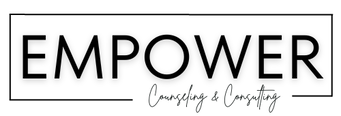

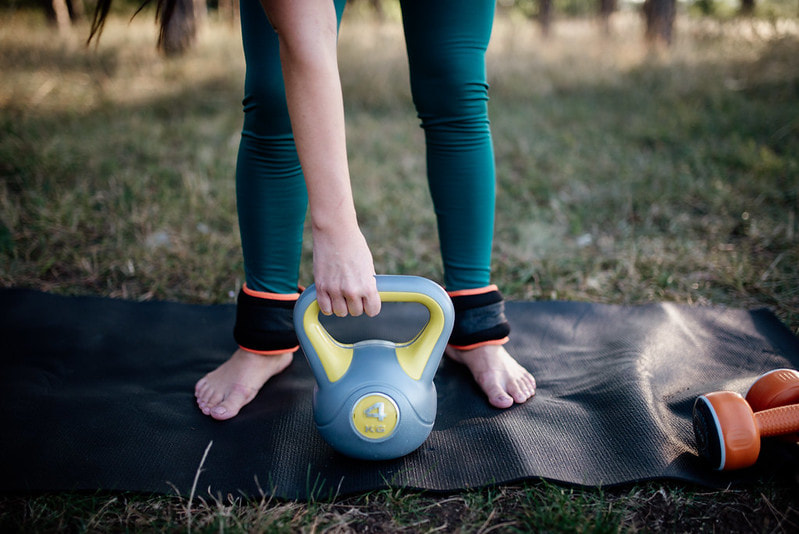
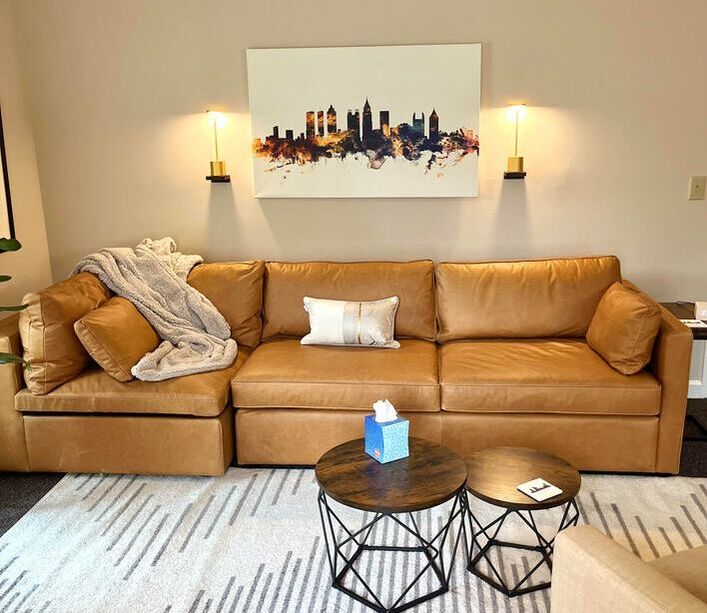


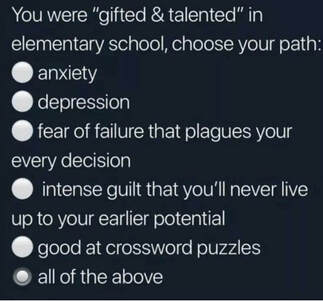

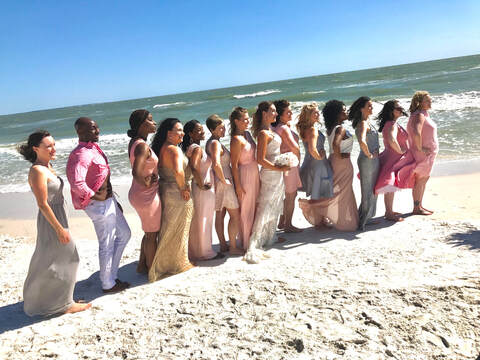
 RSS Feed
RSS Feed 